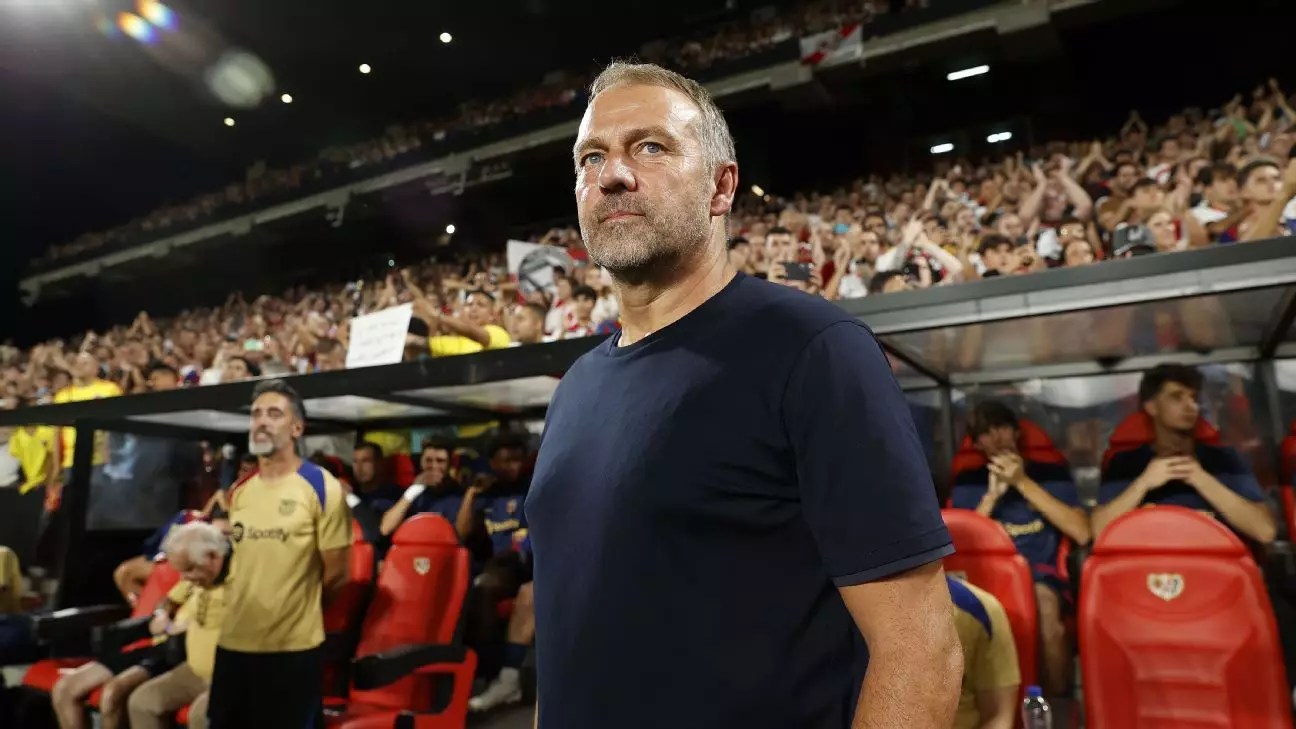Barcelona experienced a surprising defeat against Osasuna on Saturday, breaking their impressive seven-game winning streak in LaLiga. The loss raised questions about the tactical decisions made by coach Hansi Flick, specifically regarding his choice to rest several key players. In a candid post-match reflection, Flick took full responsibility for the outcome, indicating that his decisions—which included starting five different players—may have contributed significantly to the team’s underwhelming performance.
Entering the match, Barcelona was positioned to tie the club record for consecutive victories to start a LaLiga season. The lineup changes Flick implemented were designed to manage player fatigue, especially after a midweek match against Getafe. Nevertheless, his strategy backfired, as highlighted by an uninspired performance that culminated in a 4-2 defeat.
Flick openly acknowledged the repercussions of his decisions, stating, “If you want to blame someone for this defeat, blame me.” His reflections offer a glimpse into the pressures coaches face when attempting to balance player welfare and competitive performance. With injuries to key players such as Marc-André ter Stegen, Dani Olmo, and Frenkie de Jong impacting squad depth, it’s crucial for coaches to navigate these waters carefully. Flick’s approach this time, however, seemed to lack the depth required for a successful outcome.
The match unfolded with Ante Budimir scoring the opening goal for Osasuna, which established an early lead. This was soon followed by Bryan Zaragoza doubling the advantage just before halftime—both goals coming from situations where Barcelona’s defense appeared disorganized. Flick’s team struggled to control the game, and when they did finally find an answer with Pau Víctor’s goal shortly after the break, their momentum was severed by a penalty awarded to Osasuna.
Budimir’s successful conversion of the penalty post-foul by Sergi Domínguez effectively demoralized the Barcelona squad. With the score resting at 3-1, the hopes for a comeback faded. Abel Bretones’ long-range strike further widened the gap, and although Lamine Yamal netted a late consolation goal, the damage had already been done. This match serves as a stark reminder of how quickly fortunes can change in football, especially when tactical decisions lead to a loss of player cohesion and confidence.
In his post-match comments, Flick expressed belief in his team’s potential despite the disappointing result. He stated the importance of analyzing both the tactical approach and the officiating decisions that may have impacted the game’s flow. While Flick was right in believing that this defeat does not define the team’s season, he must ensure that the lessons learned translate effectively into subsequent matches. It will be critical for him to strike a balance between managing player fitness and fielding the strongest possible XI.
With challenges ahead, including a Champions League match against Young Boys and a LaLiga encounter against Deportivo Alavés, recovery from this setback becomes imperative. Fleeting positivity is important, but translating that into effective tactical adjustments and player performances is equally vital.
Despite the setback against Osasuna, Barcelona’s season thus far showcases a generally positive trajectory under Hansi Flick’s management. The team remains four points clear at the top of the LaLiga table, a validation of their strong early performances. However, continued scrutiny of Flick’s game management will be crucial, particularly as the season progresses.
The return of several injured players post-international break may offer Flick more options and greater flexibility in his selections, potentially alleviating some of the pressure. Success in the next set of matches not only hinges on player availability but also on Flick making the necessary adjustments prompted by the lessons from the defeat against Osasuna.
While the loss was significant and highlighted certain flaws in Flick’s approach, it is often through adversity that teams can discover their resilience and find their form. For Barcelona and their supporters, maintaining a positive outlook will be essential as they aim to turn the page and continue challenging for supremacy in both domestic and European competitions.


Leave a Reply